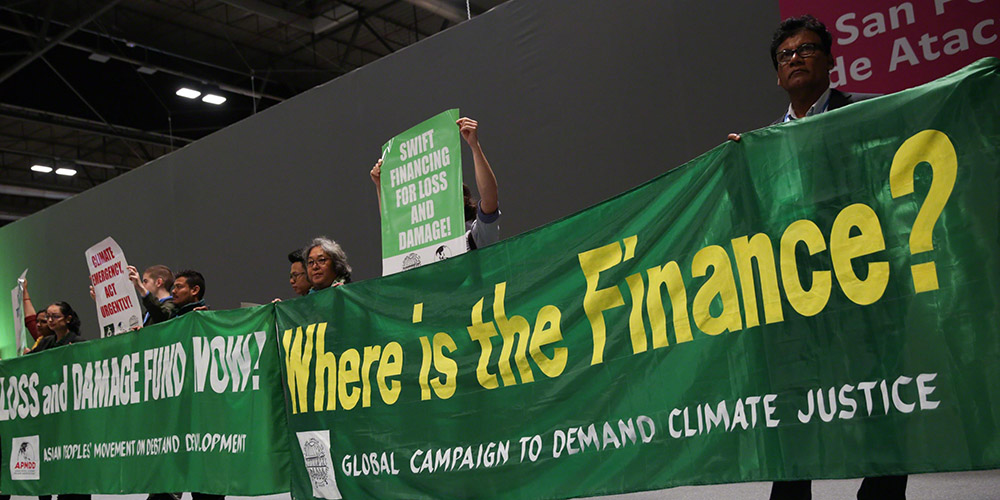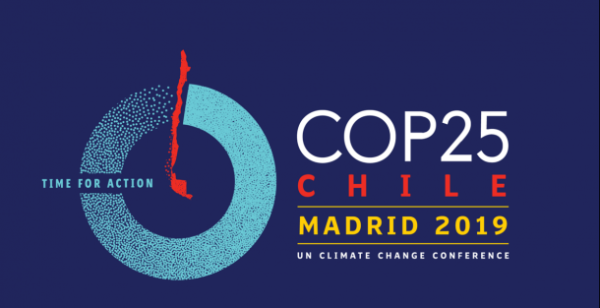A measly $100 billion
In 2009, rich countries agreed to deliver $100 billion per year by 2020. They did so in recognition of their undeniable and overwhelming share of historical pollution. Hillary Clinton plucked the $100 billion figure from thin air, presumably because she thought it sounded like a lot. In fact $100 billion pales in comparison to the real needs which developing countries have to cope with climate change while developing sustainably.
To deliver their conditional pledges of the Paris Agreement, poor nations would require $4 trillion in funding from rich countries. And, as we know, the Paris Agreement represents the baseline of ambition rather than the extent.
Every COP since 2009 has reiterated the $100 billion goal, but over time the language has been watered down. Developed countries have changed the wording from “deliver” to “mobilise” and then “leverage.” These words sound synonymous but are not. The subtle differences in wording mean a huge difference in policy. What percentage of climate finance will be grant-based vs. loans? Using “leverage” is a less serious commitment as you are not promising to stump up the cash yourself.
Academics have contested the methodology used by rich countries to demonstrate their progress towards this goal. And developing countries have long stressing that their finance needs are far from being met from any source. With things as they stand, they cannot implement their climate actions.
Where is the finance?
So to build trust at COP25, rich countries must show developing countries that they will scale up life saving funds. It’s not looking good in that regard. The Green Climate Fund, set up to support developing countries in their climate actions including adaptation, was recently promised $9.7 billion for its second replenishment. This falls short of the pledge of $10.7 billion that the GCF secured in its initial phase. Trump has not only withdrawn the US from the Paris Agreement; he has withdrawn $2 billion that Obama pledged. Australia has also refused to contribute.
The loss of this $2 billion undermines the agreement made at last year’s COP24. In Katowice countries agreed that developed countries will “continue their efforts to channel a substantial share of public climate funds to adaptation activities and to strive to achieve a greater balance between finance for mitigation and adaptation.”
Stumping up the cash is not a nice thing that rich countries do. It is their moral and, perhaps more importantly, their legal obligation. They are trying to escape this responsibility by changing the language and blurring the lines between themselves and developing countries. Rich countries do not want to be identified as rich. They would like to hide the fact that they are rich because of centuries of plunder and pollution. And they would like for poor countries to pay for the climate crisis despite not causing it.

A New Goal
In Madrid, developing countries will be fighting for new and adequate finance in several fora. One critical battleground is on long-term finance. The Paris Agreement extended the $100 billion/year by 2020 goal to 2025. But countries have not agreed on a future goal beyond that. Last year in Poland they agreed to begin a process to set a new collective goal over $100 billion. In June they discussed the matter in a workshop and will now consider the report from that workshop. In another they’ll discuss the “effectiveness” and “provision” of finance – how much money is flowing and what good it’s doing.
Developed countries are, as expected, against talking about long-term finance. They are resisting any move to assess their finance contributions. At the same time, they will try to restrict certain developing countries from accessing funds. The US has already tried to block Iran, China and Palestine from accessing finance from the GCF and GEF.
The Great Escape
Now the developed countries also want to change the membership of the Adaptation Fund Board. The Adaptation Fund is for developing countries to directly access funding for adaptation. It was created under the Kyoto Protocol and is much beloved of developing countries despite being chronically underfunded.
The Fund gets its resources via a “share of proceeds” from the Clean Development Mechanism. Countries agreed last year that the Fund would now serve the Paris Agreement exclusively, and any country which is a Party to the Agreement is eligible to sit on the Board. A consequence of serving the Paris Agreement is that the Fund will depend on a share of proceeds from the new Sustainable Development Mechanism, once in operation.
As part of their Great Escape agenda, developed countries want to re-write the composition of the Board. They want more developed country representation for starters. But they also want to remove the reference to “Annex I” and “non-Annex I” countries. These terms refer to developed and developing countries respectively and signal the differentiated responsibility each set of countries has.
Finance is always a fiercely fought topic wherever it appears in the agenda. COP25 is no different and we may see fireworks later in week 2 when the stakes are raised.

